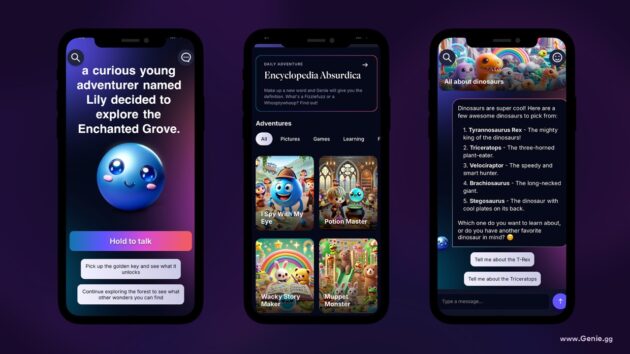
In the debate over devices, screen time, online safety, and the appropriate age for young people to be online, Darius Monsef concedes that the internet “isn’t really built for kids.”
But the Portland-based startup vet thinks an AI sidekick could help.
Monsef is the CEO and co-founder of Genie, a new app-based chatbot that acts as teacher, motivational coach, creative assistant, storyteller, game companion, and more. The goal is to provide a friendly, positive voice on the other end of an internet that can be harsh for kids.
“Genie’s entire purpose is to help kids have a better, more fun, enjoyable life, and we really tried to build the personality in that way,” said Monsef, a father of three kids ages 7 to 12. “It’s there to unlock fun, creative play and friendship.”

Monsef is building Genie with co-founder and Chief Technology Officer Asa Miller. Both worked previously at Brave Care, a Portland-based pediatric health startup that raised about $18 million. Monsef wound down the tech side of that operation. The clinics are still operating in Portland and Austin, Texas.
“Coming out of that, my co-founder and I knew we wanted to work together again,” Monsef said. “It was very clear after Brave Care that, from a professional and personal standpoint, building for kids was something we both really enjoyed and wanted to do.”
Genie, which is available on iOS, is built on OpenAI’s platform. It relies on OpenAI’s out-of-the-box moderation tools to check messages for appropriateness. The app looks for any mentions of harm, self-harm, harm with intent, violence, harassment, etc. Genie itself would not generate such messages, but the AI checks what kids are saying and heads it off where necessary.
During the beta release, Monsef said the most engaged users appeared to be in the 8-10 age range. But adults who signed in for their kids often hung around and used it, too.
“I think it’s a little bit like how Disneyland is, where it’s made for kids but it’s a really joyful place where magic exists,” Monsef said. “It’s a safe place to be. It’s just a friend to talk to.”
The goal is not to pull kids or anyone else entirely out of their real lives. For instance, Genie doesn’t know what ice cream tastes like or what a vacation feels like, but it can suggest that a child try a new flavor or see a new place and report back about the experience. Monsef said the goal wasn’t to build a starving digi pet that needs constant care and attention.
“If you seeded a model and built as the number one instruction that you care about this kid’s full health and well-being, then that kid spending all day with Genie would not be good for them,” he said.
Monsef and Miller raised $650,000 in pre-seed funding that closed at the beginning of the year from investors including Liquid2, Garry Tan, Immad Akhun, and other angels.
The startup is also taking part in the latest Y Combinator cohort. It’s Monsef’s third time participating in the accelerator.
Kid tested, kid mostly approved

Like most parents, I’ve grappled with my own kids’ screen time and worried about how they’re using the internet.
I downloaded Genie for my 11-year-old daughter Kate to try. I wanted to gauge whether interacting with AI had the same appeal as the large amount of time she spends FaceTiming and gaming with real human friends.
Kate found the app easy to use. She seemed apprehensive about coming up with her own questions for Genie, or choosing activities to do, perhaps in part because she was sitting with her dad.
A couple AI-generated jokes elicited equal parts giggling and eye rolling. She asked Genie to craft a story about a cat that moves to Paris, and the quick, ChatGPT-style reply was cute. Same goes for some AI-generated art of a cat surfing and a “Food Lab” game where Genie showed what a pickles-and-pudding combination would look like.
Over the course of 20 minutes, Kate also used Genie to do some math problems, learn a little French, discuss what photosynthesis does, and ask what coral reefs eat. All in all, a pretty productive little screen time session without a shred of harassment or any other online concern.
“It’s cool, but I don’t think I would use it every day,” Kate said, sounding a bit like she might have aged beyond Genie’s target demo. But she was intrigued by the AI’s ability to help with homework, or teach a language.
In Monsef’s view, products like Genie and the AI that powers them will eventually be part of everyone’s life. People will ask, “What AI are you using at home?” And Monsef thinks it’ll be in everything.
For Kate, if none of her human friends were answering on FaceTime, she’d be OK with reaching out to Genie.
“Maybe just to talk to or something,” she said. “Like if I didn’t have anything happening and no one was answering my calls … yeah, probably.”




